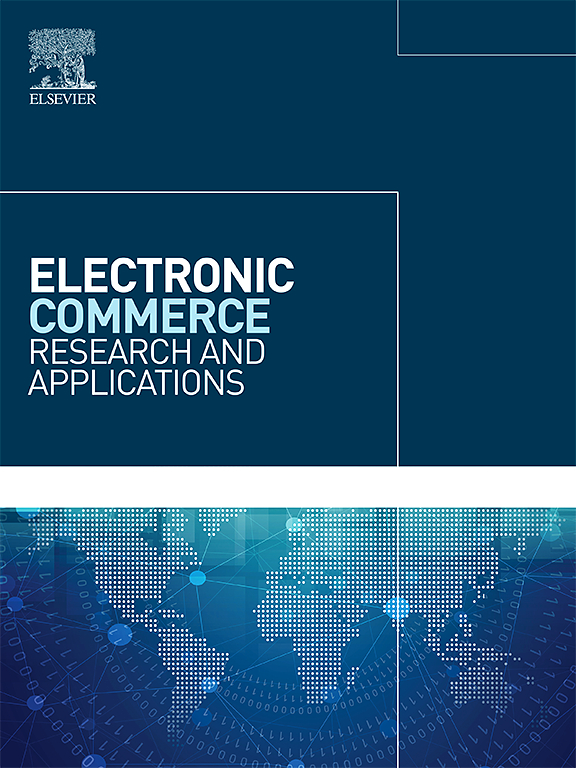How signal intensity of altruistic and strategic motivation affects crowdfunding performance? Matching among funders and platform types
IF 6.3
3区 管理学
Q1 BUSINESS
Electronic Commerce Research and Applications
Pub Date : 2025-07-02
DOI:10.1016/j.elerap.2025.101528
引用次数: 0
Abstract
Crowdfunding has gained significant scholarly attention, yet existing research primarily focuses on single-platform studies, limiting the generalizability of findings. We argue that investment motivations vary across platform types, influencing the effectiveness of altruistic and quality signals on crowdfunding performance. Using 114,095 projects from Indiegogo (reward-based) and 1,199,908 loan projects from Kiva (lending-based), we first conduct separate analyses within each platform to examine the impact of these signals. We then compare the marginal effects across platforms to assess how platform structure influences backer decision-making. Our results show that quality signals consistently enhance crowdfunding success but have a stronger influence in reward-based platforms, while the effect of altruistic signals varies, enhancing performance in lending-based platforms but diminishing it in reward-based platforms. Moreover, we identify a reciprocal inhibitory interaction between quality and altruistic signals, suggesting that emphasizing one type of signal may weaken the effectiveness of the other by diverting backers’ attention and influencing how they evaluate the project. These findings underscore the importance of platform differentiation in crowdfunding research and highlight the need to move beyond single-platform studies. Our study offers practical insights for crowdfunding initiators on how to tailor their campaigns based on platform-specific investor behavior.
利他动机和战略动机的信号强度如何影响众筹绩效?资助者和平台类型的匹配
众筹已经获得了重要的学术关注,但现有的研究主要集中在单一平台的研究上,限制了研究结果的普遍性。我们认为,投资动机因平台类型而异,影响利他主义和质量信号对众筹绩效的有效性。我们使用Indiegogo(基于奖励)上的114095个项目和Kiva(基于贷款)上的1199908个贷款项目,首先在每个平台上进行单独分析,以检查这些信号的影响。然后,我们比较了不同平台的边际效应,以评估平台结构如何影响支持者的决策。我们的研究结果表明,质量信号持续提高众筹成功率,但在奖励型平台上具有更强的影响,而利他信号的影响则有所不同,在借贷型平台上提高了众筹成功率,但在奖励型平台上降低了众筹成功率。此外,我们确定了质量信号和利他信号之间的互惠抑制相互作用,表明强调一种信号可能会通过转移支持者的注意力并影响他们如何评估项目而削弱另一种信号的有效性。这些发现强调了平台差异化在众筹研究中的重要性,并强调了超越单一平台研究的必要性。我们的研究为众筹发起者提供了如何根据特定平台的投资者行为定制他们的活动的实用见解。
本文章由计算机程序翻译,如有差异,请以英文原文为准。
求助全文
约1分钟内获得全文
求助全文
来源期刊

Electronic Commerce Research and Applications
工程技术-计算机:跨学科应用
CiteScore
10.10
自引率
8.30%
发文量
97
审稿时长
63 days
期刊介绍:
Electronic Commerce Research and Applications aims to create and disseminate enduring knowledge for the fast-changing e-commerce environment. A major dilemma in e-commerce research is how to achieve a balance between the currency and the life span of knowledge.
Electronic Commerce Research and Applications will contribute to the establishment of a research community to create the knowledge, technology, theory, and applications for the development of electronic commerce. This is targeted at the intersection of technological potential and business aims.
 求助内容:
求助内容: 应助结果提醒方式:
应助结果提醒方式:


